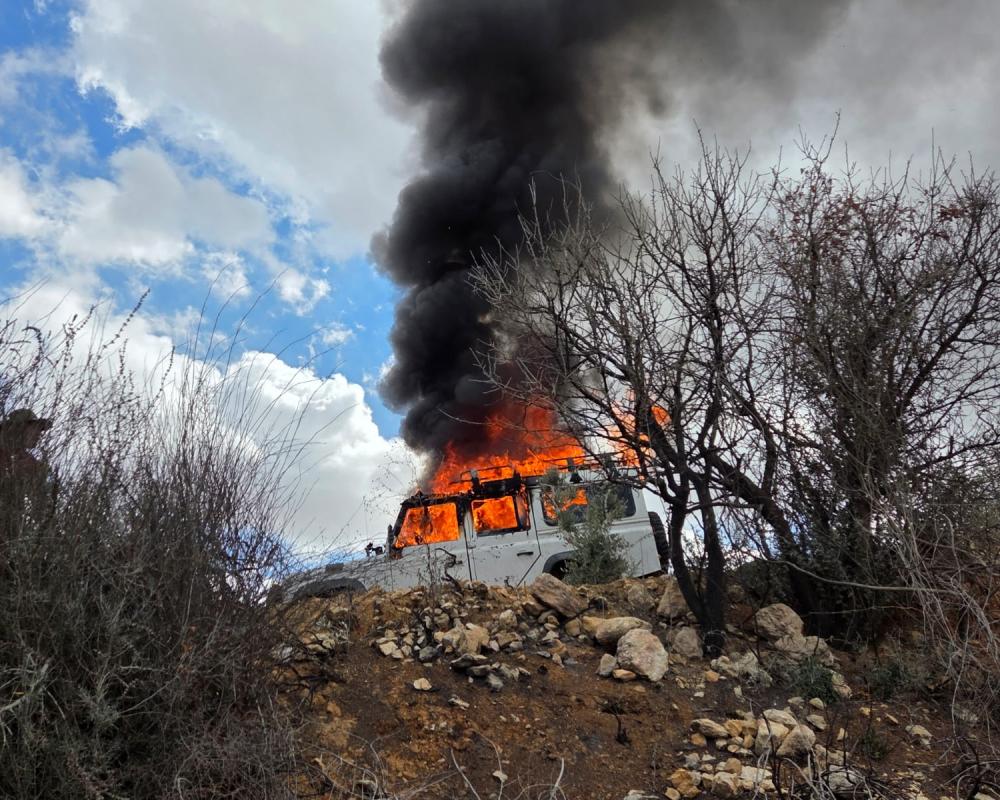Ramallah / PNN / Monjed Jadou wrote to Al-Ahram-Weekly
With the announcement of a ceasefire in Gaza and the signing of a truce agreement based on US President Donald Trump’s plan, Palestinians have grown increasingly concerned that Israel’s aggression may now shift from Gaza towards the Occupied West Bank.
Analysts say that Israeli Prime Minister Benjamin Netanyahu is seeking to maintain support from his far-right Coalition partners, a goal that appears to be driving the recent surge of settler violence across West Bank towns and villages.
Almost daily, violent attacks by Israeli settlers on Palestinian farmers have been documented, particularly against those harvesting their olive crops. At the same time, Israeli military raids continue across the West Bank, suggesting an effort to inflame tensions and keep the region unstable.
As the guns fall silent in Gaza in the wake of this month’s peace deal, calls are growing for Israel to halt its violence on the West Bank.
Every morning, farmers in the village of Al-Mughayyir northeast of Ramallah head to their groves to harvest olives in a cherished annual tradition. But before noon recently, the fields turned into a scene of chaos as dozens of settlers stormed agricultural lands between Al-Mughayyir and Turmus Ayya, firing shots, torching trees and vehicles, and assaulting farmers with clubs and stones, according to local residents.
“We had been picking olives since early morning, when settlers began shouting and setting cars on fire,” said a woman from the village. “We ran between the trees and stumbled many times on the rocky hills. We barely made it out alive.”
Videos filmed by foreign activists who came to help protect the farmers showed an elderly woman, known for joining her family in the olive harvest each year, being beaten by a masked Israeli settler. The assault left her seriously injured. Another international volunteer was also attacked when he tried to defend her.
Al-Mughayyir and Turmus Ayya were not the only targets. Villages across Nablus, Salfit, Hebron, Tubas, and Bethlehem have also witnessed similar assaults, where settlers chased farmers from their groves, cut down dozens of olive trees, set fire to vast tracts of farmland and stole harvested crops.

Israeli forces, witnesses say, provided full protection to the attackers while tightening restrictions on Palestinians. More than a thousand checkpoints and military gates have been erected at village entrances, paralysing movement across much of the West Bank and making it nearly impossible for farmers to reach their land.
Human rights activist Munther Amira from the Popular Committees Against the Wall and Settlements warned during interview with Al-Ahram-Weekly that the situation in the West Bank is rapidly deteriorating. “We are witnessing a frenzied Israeli campaign of raids, arrests, home demolitions, and forced displacement,” he told Al-Ahram Weekly.
“At the same time, settlers backed by the Israeli army and far-right ministers attack farmers, shoot at them, burn Palestinian cars and steal agricultural produce and livestock.”
Amira said the West Bank is undergoing a forced displacement campaign, as Israeli practices compel residents to leave their communities. “Forty-two Bedouin communities have already been forced out of their homes in areas larger than the Gaza Strip,” he said.
According to Amira, arrests have doubled since 7 October, and settler assaults have intensified again since the Gaza ceasefire. “Netanyahu is now trying to distract the Israeli public with a silent war in the West Bank,” he said, “one based on forced displacement and killings and settler violence, particularly through so-called grazing settlements.”
He added that Israel’s aggression in the northern West Bank camps and cities, especially Jenin and Tulkarm, is part of a broader attempt to undermine the Palestinian political system.
BRUTALITY: The olive harvest, Amira said, once symbolised joy and community unity.
“It’s a season rooted in our culture, celebrating the land, family and harvest,” he explained. “But in recent years, the occupation and settlers have turned it into a season of fear and grief, marked by attacks, arson, and theft.”

He noted that this year’s season has been especially brutal, with many farmers barred from accessing their land and others facing violence and psychological trauma. “The army uses emergency laws to ban Palestinians from approaching settlements within 200 metres,” he said, “but in practice they’ve extended it to 2,000 metres to seize more Palestinian property.”
Amira also highlighted growing settler violence against international activists. “Only a few foreign volunteers are now able to reach the West Bank due to Israeli restrictions,” he said. “Those who make it are beaten with clubs, have their arms and legs broken, and are told they will be killed if they return.”
Amira noted that while Israel recently blocked the international Freedom Flotilla from reaching Gaza, activists managed to bring in an “Olive Flotilla” of about 200 international volunteers to the West Bank, who were distributed across ten villages under heavy settler assault.
“The settlers and the army target everyone, even Israeli peace activists, calling them traitors for helping the Palestinians,” he said. One 70-year-old volunteer, he added, was attacked simply for joining the harvest.
Amira concluded that Israel’s ongoing campaign mirrors what he called “a parallel genocide” in the West Bank. “What we’re seeing in the killings, land theft, checkpoints, and isolation is part of a broader plan to confine Palestinians into disconnected enclaves,” he said.
Amir Dawood, head of the Documentation and Publishing Department at the Palestinian Anti-Wall and Settlement Commission, said the settler attacks “did not start this season alone but have escalated systematically since 7 October 2023,” exploiting the ongoing war and “a clear division of roles between the army and settlers to impose new realities on the ground.”
“These assaults are no longer isolated incidents,” Dawood told the Weekly. “They are part of a broader plan targeting the Jordan Valley, aiming to displace Bedouin communities and all under full protection from the Israeli government.”
OPEN WAR:
Kareem Jabareen, spokesperson for the Israeli human rights organisation B’Tselem, said that what is happening in the West Bank “represents the other face of the war on Gaza.”

He explained that “Israel is waging an open war on Palestinian existence through daily raids and bombardments that have killed more than 250 Palestinians in the West Bank since the beginning of the year.”
Speaking to the Weekly, Jabareen added that the Israeli authorities “have created a suffocating reality for Palestinians through more than 1,000 checkpoints and military gates closing off towns and villages.”
Human rights organisations warn that continued settler attacks amid army complicity and the absence of accountability could mark a new and more dangerous stage in the West Bank, one that may see further settlement expansion and forced displacement. They urge urgent international intervention to halt the violations and protect Palestinian civilians and farmers on their land.
Commenting on the silence of the Western countries, political analyst Mohamed Al-Taj from Tubas said that the recent assault on Afaf Abu Alia, an elderly woman from the village of Al-Mughayyir, “embodies the cruelty Palestinians have endured since the Nakba” in 1948.
A video circulated online showed a masked settler wielding a heavy wooden stick and striking Abu Alia as she picked olives with her weathered hands. “She carried no weapon, no stones, only a basket of olives and a hope for a peaceful season,” Al-Taj said to the Weekly.
“This is not an isolated act,” he said. “It reflects a colonial mentality that deems Palestinian blood, land, and dignity expendable. The settlers do not move as individuals. They act with an ideology, armed, shielded by the army, and legitimised by a far-right government that calls such crimes a ‘natural right’ on Palestinian land.”
He added that the Israeli government “plans, funds, and oversees these crimes,” noting that “the same army that should stop the attacks escorts settlers, secures their paths, and arrests any Palestinian who tries to defend himself.”
“This government has built an entire ecosystem of impunity,” Al-Taj stressed. “It allows settlers to raise their clubs with full confidence that no law, no conscience, will hold them accountable.”
“Where is the world in all this? International organisations issue statements of concern, and UN rapporteur Francesca Albanese tweets in outrage, yet nothing changes on the ground.”
He concluded with a message to the international community. “If a settler’s stick can bring down a 50-year-old woman on her own olive field, then the world’s silence can bring down what remains of humanity. Palestinians are not asking for pity, but for justice; not for tears, but for action.”


Source link
#Israeli #attacks #escalate #West #Bank #AlAhramWeekly #Report

